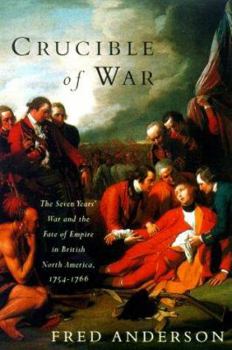The Crucible of War: The Seven Years' War and the Fate of Empire in British North America, 1754-1766
(Part of the Warhammer 40,000 Series)
Select Format
Select Condition 
Book Overview
Brimming with action-packed tales of bloodshed, heroism, and courage, this collection of stories set in the Warhammer 40,000 realm throws readers headlong onto the desperate battlefields of the 41st... This description may be from another edition of this product.
Format:Hardcover
Language:English
ISBN:0375406425
ISBN13:9780375406423
Release Date:February 2000
Publisher:Alfred A. Knopf
Length:912 Pages
Weight:0.75 lbs.
Dimensions:2.0" x 6.6" x 9.6"
Customer Reviews
5 ratings
History at its best
Published by Thriftbooks.com User , 23 years ago
Educational, informative, and entertaining, Fred Anderson's book on the conflict we Americans call the French and Indian War was truly one of the most insightful works of American history I have ever encountered. He offers a good, multi-faceted approach to the period--political, economic, sociological, and cultural. (Especially good is his analysis of the very different relations which Native Americans enjoyed with the French as opposed to the British, and the implications of this difference for later American history.) But he also clearly sees the important role played by the period's "great men," and offers vivid portrayals of such leaders as Pitt, Washington, Amherst, Wolfe, Montcalm, Forbes, and George II and III. His exploration of the political intrigues occurring in England and their effect on the North American war is especially powerful. I have lived virtually my entire life in the Middle Atlantic region, the cradle of the Seven Years' War--having been born in Pittsburgh, educated in Philadelphia, employed in Albany, and currently residing in central Maryland--but I was never able to fully comprehend the history of this seminal period until reading this superb explanation. Anderson's decision to present the war as an entity separate unto itself--not as the prologue to the American Revolution, the typical treatment of this era in other works of American history, yet a curiously "20/20 hindsight" approach--makes the book all the more enlightening, since the history is presented as it was lived at the time, rather than retrospectively from another era. The author also does an able job of presenting the simultaneous developments in this far-reaching global war in such places as India, the European continent, and the Caribbean.This book is so well-written that I regretted when it ended; I believe it is destined to take its place besides the works of Francis Parkman as a classic history of this period.
A Legitimate Classic
Published by Thriftbooks.com User , 23 years ago
Fred Anderson's stated goal in writing "Crucible of War" was to produce "a book accessible to general readers that will also satisfy...historians' scholarly expectations." I am pleased to report that he attains that goal as completely as anyone could reasonably expect.Anderson's subject is a relatively small slice of US history--the conflict known variously as the French and Indian War or the Seven Years War, along with the war's immediate aftermath. His narrative is highly informative. He describes how isolated skirmishes on what was then America's western frontier escalated into a true global war, involving every major European power. He convincingly explains how England eventually came to triumph over her rivals, and to inherit much of France's erstwhile colonial empire. Although his focus in on North America, he does not neglect events in Europe. He then shows how events like the Stamp Act Crisis and Pontiac's Rebellion were inextricably linked to the war and its outcome.Anderson deserves credit for his skillful blend of diplomatic, military, economic and social history into a coherent whole--he should be a model for other scholars in this respect. Also noteworthy is his clear identification of the interest of the four main groups involved in the North American conflict--the French and their Canadian colonists, the English, the American colonists, and the Native Americans--and his untangling of the conflicts both within and between these groups.While specialists may end up quibbling with some of the details of Anderson's interpretations, he seems to me to have amply demonstrated his claim that the French and Indian War was an extremely important influence on the revolutionary events of the following decades. "Crucible of War" is a genuine classic of historical writing.
The View from Lake George
Published by Thriftbooks.com User , 24 years ago
As an inveterate history buff who happens to live about 1000 yards from Fort William Henry in Lake George, New York (and, incidentally, dined last evening at The Montcalm Restaurant), I make it my business to read every book about the French and Indian War I can lay my hands on. But having read so many which have proved either repetitious, superficial, or both, I have grown increasingly wary of new and ever more "comprehensive" histories of the war. To this point, the very best to my mind remained Parkman's "Montcalm and Wolfe" which is as fresh and readable today as it was when published over 100 years ago. Then along comes Fred Anderson's "Crucible of War", and I guess I have to start changing my mind. The book excels in three respects. First, Anderson is a superb writer, as close as one will find to the Great Parkman. Second, it abounds with terrific maps and illustrations, many of which I have not seen before, from the Clements Collection at the University of Michigan. Third, and most importantly, Anderson does the best job of anyone I know in justifying the thesis that it was this war, and not the Revolution, which was the most significant conflict of the 18th century from "America's" standpoint because it lay the foundation for the inevtiable schism between the Colonies and the Mother Country. Time and again, Anderson demonstrates how almost every Colonial rejection of British hegemony during this period sowed the seeds which bloomed in April, 1775. An absolutely top-drawer read that herewith becomes a must for every serious student of American history and of this fascinating war.
An excellent example of the best kind of history writing.
Published by Thriftbooks.com User , 24 years ago
When I read Shelby Foote's Civil War trilogy, by about page 150 of the first volume, I had become a lifetime Civil War history buff. I now regard that as the most expensive book I ever purchased, because it sparked an interest that resulted in the purchase (and reading) of over 100 other Civil War books. Having just finished Fred Anderson's Crucible of War, I fear that process has begun anew. As Foote's masterpiece created a panoramic portrait of the 1860's, Anderson's work drew me into the 1760's in North America and the Courts of George II and III and painted a vivid and fascinating portrait of the lives of the great and the not-so-great men who fought what probably should be considered the first world war. My interest in the Civil War has always been predominately in battle and campaign studies or in the personalities of great leaders and common soldiers. So when I started Anderson's book, I presumed I would suffer the political stories and enjoy the military content. It is to Anderson's credit as a writer and a story teller that I increasingly found myself rushing through the details of the military encounters and savoring the tales of political combat that truly determined the outcome of this conflict. Anderson's thesis that the Revolutionary War and the events that lead up to it can only be truly appreciated in the context of the Seven Years War is well taken. In what is, unfortunately, an exception in much history publishing, this book is very well appointed with both maps and illustrations. It is one of the few books to pass the test that (as far as I can recall) every location mentioned in the text is located on one of the excellent maps. As an added bonus, the many period maps and fortress plans are not only well reproduced, but helpful and enlightening as well.
Excellent Reappraisal of a "Forgotten" War
Published by Thriftbooks.com User , 24 years ago
This is less of a book than an event. Probably the most interesting history book since Schama's "Citizens," and for the same reason: it tells you things you'd probably never otherwise have known, and provides context for them.While the Seven Years War has always figured front and center in European minds, it's been overshadowed in the US. But, it was the first real 'world war'. It built the British Empire, and sowed the seeds for the downfall of the western part of it, a mere ten years later. Anderson knits the complex events together with great skill, and follows the stories of the many seedy, greedy and incompetent players (along with the patriots and professionals) as they try to first turn back the tide of the French, and then figure out a way to conquer Canada. The insights into the Indian aspects of the war are remarkable. There's a lot of "battles and generals" writing, but he does not neglect the stories of ordinary soldiers and civilians.A lot of famous folk don't come across too well in Anderson's account. His penetrating comments on Washington and Wolfe won't make him a lot of friends, but, so be it.You'll come away from this knowing far more about the true reasons for the Revolution, which was almost an inevitable sequel to this conflict. I'd recommend reading it in conjunction with Kevin Phillip's "The Cousins' War."
Crucible of War: The Seven Years' War and the Fate of Empire in British North America, 1754-1766 Mentions in Our Blog

July 3 Gets Overshadowed by July 4, but It's Not Trivial in American History!
Published by Beth Clark • July 03, 2018
July 4 might be the most famous day of the month, but July 3 is a historical powerhouse equally worthy of celebrity status, so read on for some interesting trivia that your friends will be impressed with.





